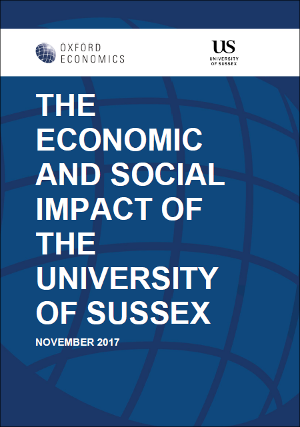Ungated Post | 05 Apr 2018
The Economic and Social Impact of the University of Sussex

The University of Sussex contributes £343 million to the annual GDP of Brighton and Hove, plus East and West Sussex. Together with its students and visitors, the university supports a total of 5,180 jobs across the region. This report outlines how this economic impact is generated by all elements of the university, before exploring the benefits it delivers to both local and national economies––and society as a whole.
One of the region’s leading employers, the University of Sussex directly employs some 2,390 staff, 87 percent of whom live in the local area. Together with its students and visitors, the University sustains £74.9 million in annual tax revenues, enough to pay the running costs for the East Sussex Fire Authority for almost two years.
But the University’s value extends far beyond its core economic impact. Each year it produces thousands of talented graduates, more than 5,000 in 2016, many of whom go on to work locally and in “socially significant” roles as teachers, social workers and doctors. A notable proportion of the University’s graduates working local do so in professional occupations, including those working in science, research and engineering.
The university also plays a leading role in cutting-edge research. In 2015/16, it attracted £35.6 million in funding for R&D activities that deliver long-term benefits for society at large. Using our input-based model of research impact, we found the future benefits of this research to deliver social and private benefits reaching £154 million gross value added.
Oxford Economics’ team is expert at applying advanced economic tools that provide valuable insights into today’s most pressing business, financial, and policy issues.
To find out more about our capabilities, contact:
Americas
Diantha Redd
+1 (646) 503 3052
Email
Asia Pacific
Peter Suomi
+65 6850 0110
Email
EMEA
Aoife Pearson
+44 (0)203 910 8054
Email
Related Services

Post
The Economic Footprint of JLR in the UK
This report examines the economic footprint of JLR in the United Kingdom in 2024. The analysis is conducted both at the national level, as well as on the West Midlands and North West regions, where JLR’s main facilities are located.
Find Out More
Post
Airbnb’s Economic Contribution to APAC in 2024: GDP, Jobs, and Regional Impact
Airbnb's platform connects hosts across Asia Pacific (APAC) with travellers from around the world. Oxford Economics was commissioned by Airbnb to quantify its economic footprint in 10 APAC markets in 2024.
Find Out More
Post
Economic Insights: Airbnb’s Contribution Through the Lens of Oxford Economics
Oxford Economics Australia delivered a tailored economic impact assessment for Airbnb, including GDP contribution modelling, job creation analytics, guest‑spend segmentation, and regional tourism dispersion insights to underpin Airbnb’s stakeholder communications and strategic growth initiatives.
Find Out More